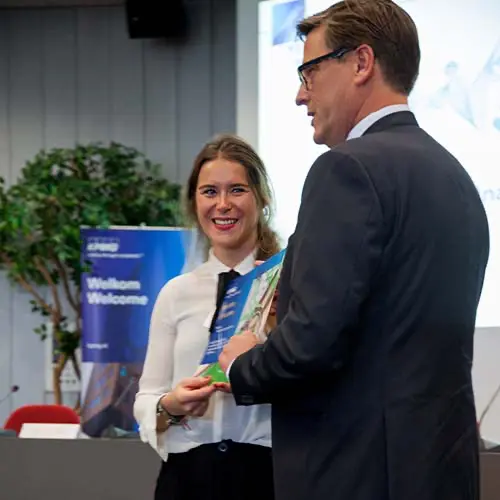Topscriptie over harde winst duurzaam inkopen
Sophie Gaarenstroom heeft KPMG-RSM Sustainability Master Thesis Award gewonnen. De jury vond haar scriptie over 'Socially Responsible Purchasing' een baanbrekende studie naar duurzaam inkopen in the real world’: de maak- en de machine-industrie.
De winnares kreeg de prijs van 1000 euro uitgereikt door juryvoorzitter Jan van den Herik, director Strategy & Innovation bij KPMG. Ook de hoofdredactie van P+ People Planet Profit maakte deel uit van de jury, naast Elfrieke van Galen en Tim van Kooten.
De jury was unaniem in de keuze voor dit onderzoek, dat op een bijzonder grondige wijze de voordelen van het proces van duurzaam inkopen in de Business to Business-markt uiteen zet. Inkopers die deze scriptie op hun nachtkastje hebben liggen, krijgen alle fundamenteel wetenschappelijk onderzoek over hun vak op een presenteerblaadje aangeboden. Plus datgene wat de winnares aan eerder onderzoek toevoegde, over de effecten van afstand tussen koper en leverancier, bijvoorbeeld. Maar ook over het financiële voordeel dat in praktijk werd behaald. Ze kreeg er een 9 voor, als minimum-beoordeling was een 8,5 noodzakelijk om tot deze competitive te worden toegelaten.
De 27-jarige Gaarenstroom (1987) werkte al bij Shell, toen zij voor de Erasmus Universiteit haar scriptie schreef. Ook Shell-inkopers behoorden tot de respondenten. Ze is nu account manager voor euroShell Fleet.
We citeren nu het volledige jury-rapport:
“This is a well written and business oriented thesis. The management summary is to the point and cristal clear.
The research question guiding this thesis is: “What is the effect of socially responsible purchasing on operational and relational efficiency of a buyer-supplier relationship and does geographical distance influence the strength of this relationship.
Sophie had a sound project design starting with a pilot study to develop and test her questionnaire first amongst two multinational companies and one mid-sized company. The respond rate was very high 20.3% with a effective sample of 257 purchase managers.
Socially Responsible Purchasing requires a warm cooperation all through the supply chain, but one always be has to be aware of the potential downfall (The dark side of close relationships, according to Erin Anderson and Sandy Jap).
This thesis opens a view on the broader benefits of Socially Responsible Purchasing. The findings show that buyer-supplier collaboration has a strong positive effect on both operational efficiency and relational efficiency. Geographical distance is not found to influence the strength of the relationship.
Purchasing stands central to value creation for manufacturers and traders.
Optimization of better cooperation and decision-making in the value chain is in itself a learning process between business partners.
Little research has been conducted in the field of SRP and its effects on buyer firm benefits. Sophie’s thesis is therefore a very welcome piece of work for the real world of Socially Responsible Purchasing.”
De prijs voor de runner up was ook voor een vrouw. Britt de Lange reisde naar Kenia af om daar drie maanden lang praktijkonderzoek te doen naar de vraag: 'Microfinance over-indebtedness, truth or myth?'. Het resultaat is bijna research-journalistiek, met een wetenschappelijke onderbouwing. De ex-studente ontdekte dat er in Nairobi zoveel concurrerende microfinancieringsorganisaties (mfi’s) zijn, dat mensen bij meerdere banken leningen afsluiten. Er ontstaat door deze stapeling van schulden, vaak met rentepercentages van boven de 20 procent, een enorm sociaal probleem veroorzakend. De Lange raakte zo betrokken bij de problematiek dat ze zelfs een voorstel formuleerde om nog erger te voorkomen. De microkredietbanken moeten in haar visie namen van klanten uitwisselen, zodat voorkomen kan worden dat leners het ene gat met het andere gat gaan vullen. Door onderlinge concurrentie en groot aanbod van beschikbaar geld, wordt dat tot nu toe niet gedaan.
Het lovende juryrapport over Britt de Lange:
“Written in a flowing, practical and readable style, this thesis is helping us to see the difference between the model world and the real world application of microfinancing as a development tool.
Microfinance is examined in the mature Kenyan/Nairobi market and Britt is clearly able to elaborate on the downside of microfinance (over-indebtedness), whereas the results will enable MFIs to spot early warning signals of over indebtedness
Actually, it is really shocking how Britt is able to unravel the downside of a highly competitive and target driven mature MFI market. This study provides an image of what happens in such a market. Participants saw outreach increase, competition intensify, clients increasingly borrow from more than one organization, clients diverting credit to non-business purposes such as household expenses, and they perceived over-indebtedness to become more common.
It appears that literature has failed to investigate the phenomenon of maturing microfinance markets. Secondly, literature has been looking for increasing outreach of financing, and overlooking higher outreach, which may lead to increased multi-borrowing.
Thirdly the thesis describes the process of over-indebtedness and over-funding of clients.
Micro Finance Institutions may be kindly advised to read this thesis and the 11 propositions in the concluding advice to MFI's.”
Net als Britt de Lange toonden ook de andere genomineerden belangstelling voor armoedevraagstukken; het People-aspect van duurzaam ondernemen.
Joost Boer reisde af naar Vietnam, om te zien hoe een Japanse multinational een Base of the Pyramid-praktijk (BOP) probeerde op te bouwen, door een lokale fabriek te starten. Dat is een bijzondere invalshoek: meestal zijn de BOP-praktijken meer productgericht.
Ook Daphne Blokhuis schreef over de BOP-praktijken, ditmaal vanuit de vraag hoe pilotprojecten kunnen worden opgeschaald. De titel van haar werkstuk: 'Scaling inclusive Business'.
Zeker ook de moeite waard is de vraag wat er gebeurt wanneer je klanten zelf een prijs voor een product laat bepalen. Laura van de Ven onderzocht de effecten van deze ‘Pay What You Want’ Pricing Strategy op Fairtrade-producten. De groep consumenten die welbewust voor dit sociale keurmerk kiest, bleek bereid nog iets meer te betalen, dan de vastgestelde verkoopprijs: 15 procent. De onderzoekslokatie: De coffeecorner bij de Erasmus Universiteit zelf. Het product: Fair Trade hete chocolademelk.
P+ biedt hierbij de winnende scriptie als PDF-file aan. Zie de linkerkolom, onderaan.

